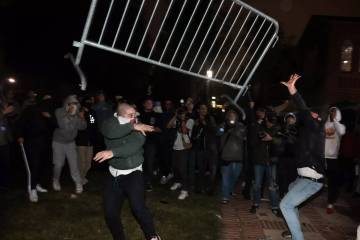Bikers blaze illegal trails
RENO -- Mountain bikers with a need for speed and thrills have made Lake Tahoe the latest front in a battle over the illegal construction of bike trails in national forests and other public lands.
The U.S. Forest Service is cracking down after bikers secretly cut up to 30 miles of trails in the Tahoe backcountry over the last decade.
Agency officials blame bikers seeking access to steeper, more demanding terrain for bootleg trails in national forests across the country, including in California, Colorado, Montana, North Carolina and Utah.
"It's a national problem," said Garrett Villanueva, engineer for the agency's trails program at Lake Tahoe. "Some places the problem is more pronounced than others."
Forest Service officials said illegal trails cause erosion, threaten water quality, and disturb vegetation and archaeological sites. The trails also pose a safety threat. They said a rider was hospitalized this summer with head and spinal injuries after crashing on a jump on an unauthorized Tahoe trail.
The agency has spent $29,000 to close three miles of illicit trails at Tahoe this year.
Mark Eller, spokesman for the International Mountain Biking Association based in Boulder, Colo., attributes the problem to a demand for more challenging trails by thrill-seeking bikers known as freeriders.
Freeriders, who enjoy downhill runs with jumps, steep drops off rocks and higher speeds, don't find the 255-mile bike trail system in national forests around Tahoe exciting enough.
The association, the leading advocacy group for the nation's estimated 40 million mountain bikers, does not condone the illegal activity, and is working with the Forest Service to step up construction of environmentally sustainable trails, Eller said.
"The pirate trail builders believe they have to build them under cover, because they won't get the riding experience they want if they go through the right channels," Eller said. "We're working hard to show that's not the case."
Joel Baty, an avid mountain biker and rental manager at Olympic Bike Shop in Tahoe City, Calif., said freeriders want trails like those at Whistler Mountain Bike Park in British Columbia, one of the world's premier mountain bike parks.
"The existing trails just aren't challenging enough for more advanced riders," he said. "So what happens is they go out and build stunts and bigger jumps, and the Forest Service doesn't tend to like that sort of stuff."
The extent of illicit bike trails nationwide is unknown because no Forest Service inventory has been conducted, said Jim Bedwell, the agency's director of recreation and heritage resources.
The problem appears more pronounced in the West, where the vast majority of national forests are located and steeper terrain proves more tempting to bootleg trail builders.
"It's something that does occur, particularly in national forests close to urban areas or communities that feature outdoor recreation," Bedwell said. "We will act to prevent resource damage when we see it."
In North Carolina, four men were arrested in 2003 on suspicion of building an illegal bike trail in the Pisgah National Forest. They agreed to pay a fine, to accept an indefinite ban from the national forest and to take part in supervised trail work to avoid prosecution.
The Forest Service also has worked with bike clubs to close many user-created trails in the Pisgah's Bent Creek Experimental Forest near Asheville, N.C.
"It's hard to catch these folks, because they're out in remote areas," said Randy Burgess, a Pisgah district ranger.
The unauthorized trails aren't confined to national forests.
In Massachusetts, the 2,200-acre Lynn Woods Reservation near Boston, which includes Walden Pond, was almost closed to mountain bikers because of unauthorized trail building.
Lynn Woods has about 40 miles of official trails and eight miles of unsanctioned trails etched by bikers seeking "boulders to scale and drops to ride off," said park ranger Dan Small.
"If they see something that attracts their attention, they think nothing of cutting a new path to get to it," Small said. "Once a new path exists, it is almost impossible to get rid of. I've seen damage in areas that almost made me cry literally."
Near San Francisco, three men were ordered to pay $34,360 in restitution and perform at least 200 hours of service after they pleaded guilty to destroying federal property to build an illegal bike trail in the Golden Gate National Recreation Area in 2001.
One of the men was arrested again in 2008 on suspicion of building an illegal bike trail in China Camp State Park in San Rafael, Calif.
Similar trails have been carved in the Trabuco National Forest covering the Santa Ana Mountains between Orange and Riverside counties in Southern California.
Trees there are being cut for illegal bridges and ramps, but the Forest Service lacks the resources to get a handle on the problem, said Debra Clarke, its wilderness and trails manager.
"I'm responsible for 40,000 acres, and I have no staff," she said. "It's one of the many big issues we deal with."
In Utah, the Forest Service is working with bike groups to resolve issues over a six-mile, user-created bike trail in the Wasatch Range's Little Cottonwood Canyon near Salt Lake City, said Steve Scheid, an environmental coordinator for the Uinta-Wasatch-Cache National Forest.
The agency tried to close the trail, but lacks the resources to keep bikers off.
"I'll bet another 10 to 20 miles (of illegal trails) are in the district that we're not aware of," Scheid said. "The knee-jerk reaction is to stop it, but we realize we can't do that. We then try to figure how to meet the demand in an environmentally sensitive manner."
In Colorado, the Forest Service recently closed a network of bike trails around the Telluride Ski Resort. Officials hope to see fewer illegal trails now that a private bike park is under construction there, said Judy Schutza, a district ranger in the Grand Mesa-Uncompahgre-Gunnison National Forest.
At Tahoe, the Forest Service has cited six offenders this year and urged bikers to cooperate in building sanctioned trails. Offenders risk fines up to $5,000, six months in jail and restoration costs.
U.S. Forest Service
International Mountain Biking Association




























